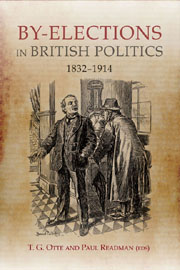Book contents
- Frontmatter
- Contents
- List of Figures and Tables
- List of Contributors
- Preface and Acknowledgements
- List of Abbreviations
- Introduction
- 1 ‘Plumping Contests’: The Impact of By-elections on English Voting Behaviour, 1790–1868
- 2 Government Appointment By-elections: 1832–86
- 3 ‘We should have had 1,000’: The By-elections of the 1874 Parliament
- 4 ‘The Glamour of Independence’: By-elections and Radicalism during the Liberal Meridian, 1869–83
- 5 ‘The Swing of the Pendulum at Home’: By-elections and Foreign Policy, 1865–1914
- 6 By-elections and the Modernisation of Party Organisation, 1867–1914
- 7 ‘A Terrific Outburst of Political Meteorology’: By-elections and the Unionist Electoral Ascendancy in Late-Victorian England
- 8 Land Reform and By-elections, 1885–1914: Do By-elections Matter?
- 9 Edwardian By-elections
- 10 Lloyd George, Limehouse and the Realignment of British Politics: The Bermondsey By-election of 1909
- 11 By-elections and the Peculiarities of Scottish Politics, 1832–1900
- Index of By-election Contests
- General Index
1 - ‘Plumping Contests’: The Impact of By-elections on English Voting Behaviour, 1790–1868
Published online by Cambridge University Press: 05 May 2013
- Frontmatter
- Contents
- List of Figures and Tables
- List of Contributors
- Preface and Acknowledgements
- List of Abbreviations
- Introduction
- 1 ‘Plumping Contests’: The Impact of By-elections on English Voting Behaviour, 1790–1868
- 2 Government Appointment By-elections: 1832–86
- 3 ‘We should have had 1,000’: The By-elections of the 1874 Parliament
- 4 ‘The Glamour of Independence’: By-elections and Radicalism during the Liberal Meridian, 1869–83
- 5 ‘The Swing of the Pendulum at Home’: By-elections and Foreign Policy, 1865–1914
- 6 By-elections and the Modernisation of Party Organisation, 1867–1914
- 7 ‘A Terrific Outburst of Political Meteorology’: By-elections and the Unionist Electoral Ascendancy in Late-Victorian England
- 8 Land Reform and By-elections, 1885–1914: Do By-elections Matter?
- 9 Edwardian By-elections
- 10 Lloyd George, Limehouse and the Realignment of British Politics: The Bermondsey By-election of 1909
- 11 By-elections and the Peculiarities of Scottish Politics, 1832–1900
- Index of By-election Contests
- General Index
Summary
Although the word by-election or ‘bye-election’ has been around since at least the early 1830s, it was not until the latter part of the nineteenth century that its use became increasingly widespread. Prior to this, the terms most commonly used were ‘single election’, ‘single-handed election’, ‘plumping election’ and, on occasion, even ‘thumb-screw’ or ‘screw election’. This difference of language represents an important point that has been curiously neglected by historians of English electoral politics. The earlier terminology, with its emphasis on a solitary option and references to special electoral pressures, reflects the fact that most English constituencies throughout this period continued to elect two (sometimes more) MPs. Even after the 1832 Reform Act's increase in the number of single seats, only 21% of England's constituencies elected one MP, and combined together they contained a mere 4% of the English electorate. The business of having to vote for just one MP at a by-election in this period therefore constituted a very different kind of poll from that experienced in most general elections. Casting one vote is, of course, a matter of routine to a modern voter. But to the 96% of English electors who were used to having multiple votes at their disposal, a by-election removed a whole range of well-established conventions and electoral possibilities. These included polling for candidates from different parties or ‘splitting’, deliberately choosing to cast a solitary vote or ‘plumping’, and allocating one vote to satisfy a local interest or community, including all those without the vote, in an electoral system where all polling was public knowledge until the introduction of the secret ballot in 1872.
- Type
- Chapter
- Information
- By-Elections in British Politics, 1832-1914 , pp. 23 - 50Publisher: Boydell & BrewerPrint publication year: 2013



